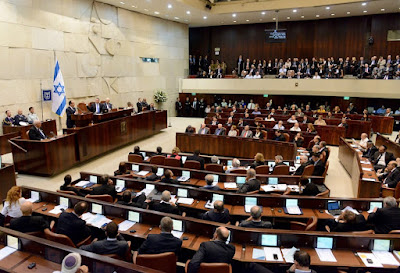By Rav Haggai Londin, yeshiva.co, translated by Hillel Fendel
The Divine Idea reaches full expression only in the form of national Jewish life in the Jewish land – and not simply via individuals, no matter how righteous they may be.
We know that the Book of Genesis (B'reshit) is followed by that of Exodus (Sh'mot) – and there is great significance to this order. B'reshit deals with individuals: Avraham, Yitzchak, Yaakov, Yosef, etc. – but Sh'mot deals with the beginning of the Jewish presence in history as a nation. As Rav Tzvi Yehuda HaCohen Kook wrote, "From the value of the individual [in B'reshit], we move on [in Sh'mot] to the value of the communal."
How can we implement, to the maximum extent, the Patriarchs' aspiration to keep and transmit the path of G-d "to perform righteousness and justice" (B'reshit 18,19)? What is needed is a nation – a great community that appears in the form of a state and its full national life. As Rav Avraham Yitzchak HaCohen Kook explained, this Torah community upon which will be formed this righteous nation "must have a political and social state and a national royal seat of government, the summit of human culture, the manifestation of what the Torah calls 'a wise and intelligent nation, a great people.'"
Why is this? Why is a national framework the only way to go in order to fulfill G-d's plan for history?
First of all, a technical answer: The influence of a great community is clearly infinitely broader than that of individuals. Not just quantitatively: We know that history is not the story of individuals, but that of nations. Just as we do not relate to individual cells of our body, so too the human race, when taking the broad view, relates to nations and not to individual people, no matter how great they may be. History moves according to the pace of nations, and it is national events that leave their imprint.
Secondly, a private person is limited in the years of his lifetime, in the extent and variety of skills and aptitudes he is granted and can develop, and therefore in his ability to have an influence upon the world. Even if an individual bears in his consciousness a holy and uplifting philosophical-theological worldview, he simply does not have a full and complete array of life-forces. He can be replete with abstract ideas, but if they lack the aspects of "real life," they are always just "on the edge," but not inside. It is no great feat for individuals to live a life of holiness, but if their sublime ideas do not succeed when they meet up with social frameworks, and when they do not have the required strength and might to manage and direct public life, this is a reflection of an essential flaw in its actuality.
This is not true of the life of the Jewish Nation, however. Given that the objective of that which is holy is to embody and imbue the divine idea in the very nature of life, it must appear in the form of the Torah's definition of the ideal Jewish nation: "A kingdom of priests and a holy nation" (Sh'mot 19,6) - in a nation in which life is dynamic and vibrant at the height of its power.
And once we understand that full vibrant Jewish national life is the embodiment of the divine idea, it becomes clear that the Israelite ideal can only happen in the Land of Israel. Anywhere else can only host Torah abstractness of the Diaspora. Am Yisrael (the Nation of Israel) is not just a group of people who happen to believe in a particular ethical-religious philosophy known as Torah.
Rather, the soul of the Israelite nation is manifest in three dimensions of reality: the human dimension, which is Am Yisrael; the material/political dimension known as Eretz Yisrael; and the abstract, intellectual dimension called Torat Yisrael.
This is also the principle that stands behind the famous speech of Rav Tzvi Yehuda, in which he explained the Talmud's statement that the blessings we recite before studying Torah every day are "the choicest of blessings." The blessings praise G-d for having "chosen us from among the nations and given us His Torah" - and Rav Tzvi Yehuda explains that because Jewish nationhood is mentioned even before the Torah, it means that Torah must be studied from amid the understanding of the importance of G-d's choice of the Israelite nation. In his words (paraphrased for clarity):
The Gemara asks in two places why the Jewish presence in the Land was destroyed, and states that neither the Sages, nor the Prophets, nor even the Ministering Angels could answer this question, "until G-d Himself explained it (Jeremiah 9,12): 'G-d said, for having abandoned My Torah.'" And the Gemara continues that this means that they did not recite the Blessings over the Torah before studying – meaning that they did not study Torah from the true perspective, that of Israelite nationalism, our pride, the 'Gaon of Israel' (Hosea 5,5).
Thus, our individual decisions, such as where and how to live, must be made with individual considerations, but from a Jewish-national perspective.

No comments:
Post a Comment